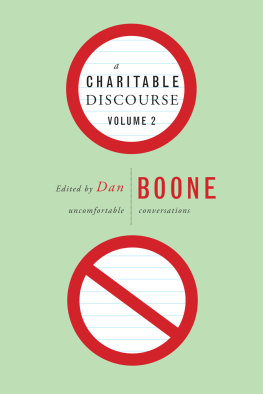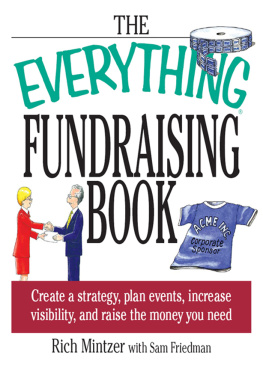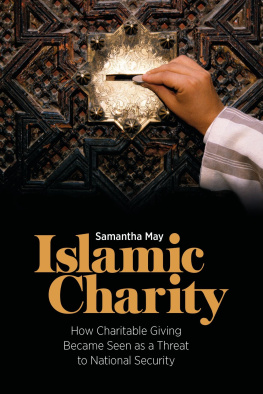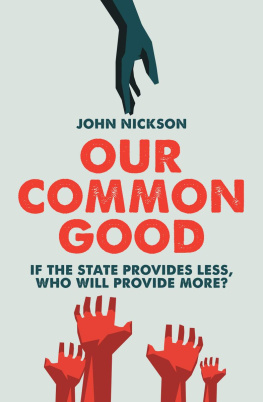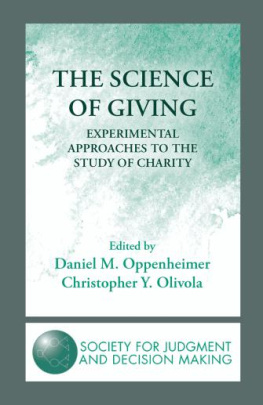

First published in Great Britain in 2017 by
Policy Press University of Bristol 1-9 Old Park Hill Bristol BS2 8BB UK Tel +44 (0)117 954 5940 e-mail
North American office: Policy Press c/o The University of Chicago Press 1427 East 60th Street Chicago, IL 60637, USA t: +1 773 702 7700 f: +1 773-702-9756 e:
Policy Press 2017
British Library Cataloguing in Publication Data
A catalogue record for this book is available from the British Library
Library of Congress Cataloging-in-Publication Data
A catalog record for this book has been requested
ISBN 978-1-4473-2502-4 paperback
ISBN 978-1-4473-2500-0 hardcover
ISBN 978-1-4473-2503-1 ePub
ISBN 978-1-4473-2504-8 Mobi
ISBN 978-1-4473-2501-7 ePdf
The right of Beth Breeze to be identified as author of this work has been asserted by her in accordance with the Copyright, Designs and Patents Act 1988.
All rights reserved: no part of this publication may be reproduced, stored in a retrieval system, or transmitted in any form or by any means, electronic, mechanical, photocopying, recording, or otherwise without the prior permission of Policy Press.
The statements and opinions contained within this publication are solely those of the author and not of the University of Bristol or Policy Press. The University of Bristol and Policy Press disclaim responsibility for any injury to persons or property resulting from any material published in this publication.
Policy Press works to counter discrimination on grounds of gender, race, disability, age and sexuality.
Cover design by Andrew Corbett
Front cover image: Bigstock
Readers Guide
This book has been optimised for PDA.
Tables may have been presented to accommodate this devices limitations.
Image presentation is limited by this devices limitations.
To all fundraisers, whose work enables so many good things to happen, and in particular to those fundraisers who so kindly made time to contribute to the research presented in this book.
[Fundraisers] empower those with financial resources to convert the dross of their money into the gold of a better society by providing opportunities to give, they empower us to breathe more meaning into our lives.
Arthur C. Brookes, New York Times , 29 March 2014
Contents
Beth Breeze is a Senior Lecturer in Social Policy, and Director of the Centre for Philanthropy at the University of Kent. She previously worked as a fundraiser and charity manager. She has served as a charity trustee and is involved as a volunteer in a number of charitable organisations.
Her previous books are: Richer Lives: Why Rich People Give (Directory of Social Change, 2013), co-authored with Theresa Lloyd; The Logic of Charity (Palgrave, 2015), co-authored with John Mohan; The Philanthropy Reader (Routledge, 2016), co-edited with Michael Moody.
She has also written numerous reports on charitable giving and philanthropy, including the annual Coutts Million Pound Donor Report, which has tracked trends in donations worth 1 million or more since 2008.
Information on all the Kent Centre for Philanthropy publications is available at www.kent.ac.uk/sspssr/philanthropy/publications
The research contained in this book was funded by a Leverhulme Trust Early Career Fellowship (ECF-2012-488). The support of the Leverhulme Trust has been crucial not only for this specific study, but also for enabling me to secure a permanent academic position and launch my research career. I am deeply grateful for the original philanthropic act of William Hesketh Lever in establishing the Trust in 1925, and to the ongoing efforts of the Trusts staff, especially the director, Professor Gordon Marshall, and my Grants Administrative Officer, Andreas Heiner.
I also wish to acknowledge the essential contribution of the UKs Institute of Fundraising, whose support as a research partner enabled me to recruit participants for the research and gave me a direct means of sharing and refining the research with members, especially at their annual summer conventions, and also at regional events around the country.
Robert Johnston gave me my first job in fundraising, at the Cardinal Hume Centre in London, which provides homeless young people, families in need, and individuals living in poverty with the support they need to realise their full potential. I am grateful for that opportunity, and proud to be associated with such a worthwhile and well-run charity.
I very much enjoyed sharing some of this research journey with Gloria Jollymore, whose Canadian data and practitioner insights greatly enhanced my thinking, and whose reflections on the art of fundraising were especially invaluable.
My Kent colleagues Dr Rob de Vries and Dr Heejung Chung both provided generous help with the analysis of quantitative data, and Emeritus Professor Hugh Cunningham kindly offered insights and feedback for the historical chapter.
Professor Gareth Morgan is a constant and generous source of insight on charity finances. Amanda Delew and Dr Chris Einolf are both busy, in-demand people who somehow found the time to read and comment on the whole draft. I wish to record my particular thanks to the members of my research advisory committee for their patience, generosity and wisdom: Kate Brown, Donna Day Lafferty, Dr Jane Hudson, Paul Marvell and Associate Professor Wendy Scaife.
I was also fortunate to receive excellent research assistance from Lesley Alborough, Dr Kayleigh Flaxman and Dr Yeosun Yoon.
My sincere gratitude to all those named above does not alter the fact that remaining errors are mine alone.
My husband Michael and our lovely children Beren and Meredith patiently endured my distraction during the writing of this book. Im very grateful for the constant supply of cups of tea and the even more constant supply of pictures to brighten the wall above my desk.
Some years ago, a university colleague told me he had once applied for a job as a fundraiser before realising that, in his words: I didnt want to spend my working life trying to make people do things they dont want to do. I had worked as a fundraiser for a decade before becoming an academic in the emerging field of Philanthropic Studies, and that colleagues depiction of fundraising simply did not ring true: most people do want to give, and the role of the fundraiser is not to twist arms, but to help people put their altruistic intention into action. That conversation was one of many moments that prompted me to write this book, which seeks to explain the importance of fundraising and the need for a better understanding of fundraisers.
For me, being a fundraiser was as close to a dream job as a newly graduated, idealistic and penniless 20-something could hope for. From my first day as a fundraiser at a youth homelessness charity I felt I was doing something useful and fulfilling, I met interesting people, had a fair amount of autonomy, and got paid a reasonable salary. Whats not to like about a job like that? But even at the time, I knew my view was not widely shared: family worried it wasnt a proper job, friends asked how I could bear to beg, and my then-boyfriend, who worked in sales, told his colleagues (admiringly, I think) that Beth makes a living out of selling nothing !


